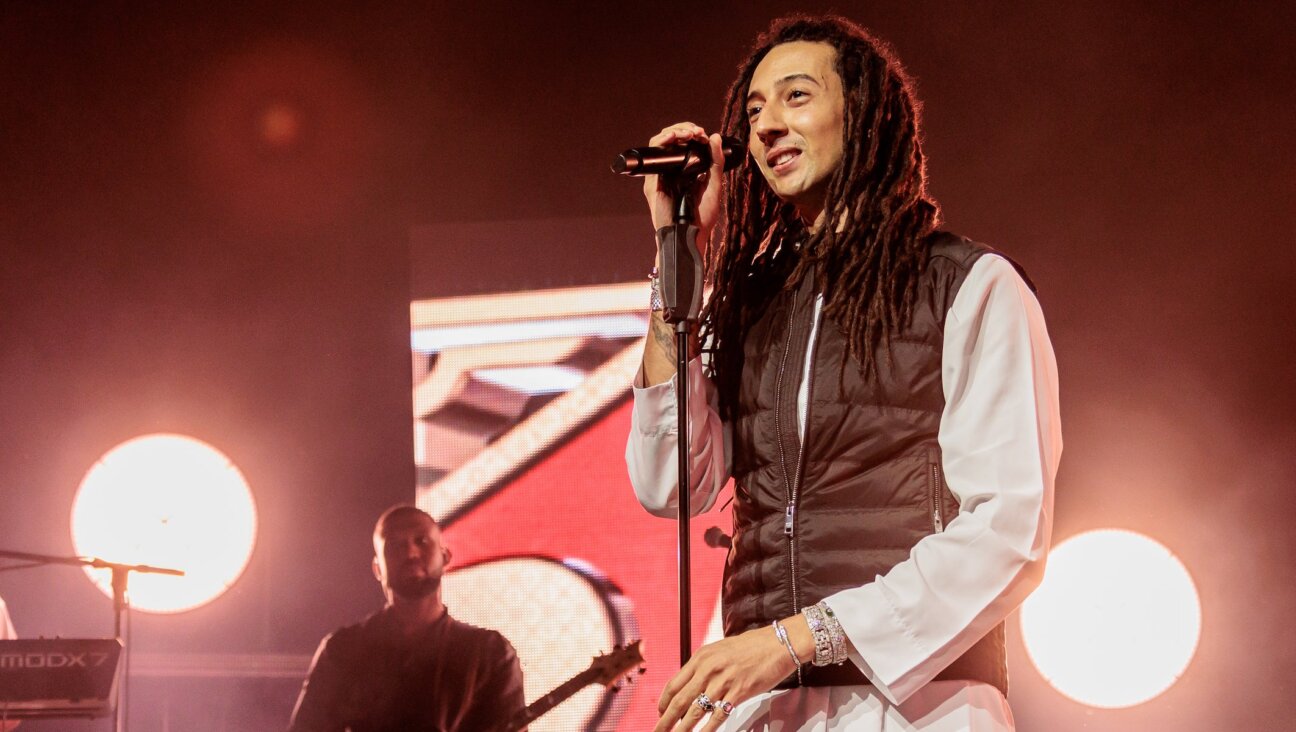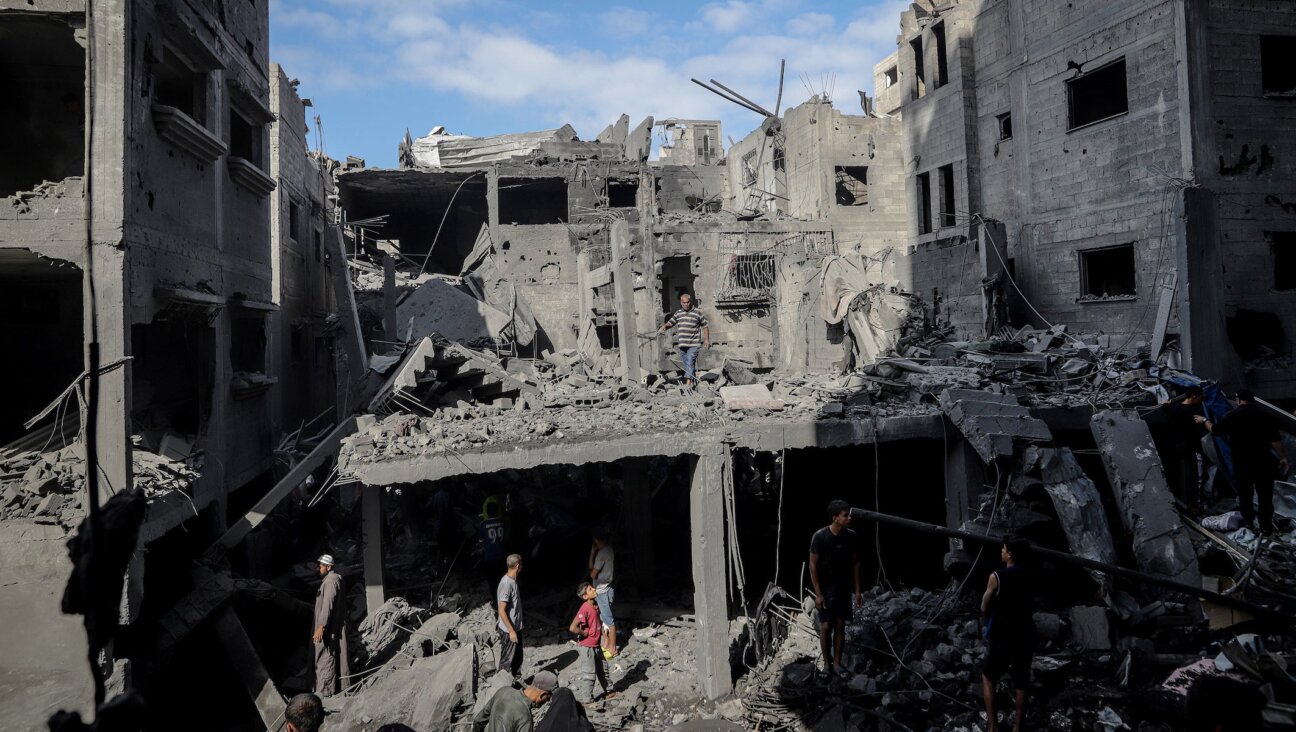Meet the rabbi, military chaplain and Jewish educator who wants to thank you for your service

Chaplain Larry Freedman (R) with his mother. Image by Courtesy of the Author
In less than a week, Larry Freedman was called to fight the coronavirus epidemic on two different fronts.
As a religious school director in Pittsburgh, Rabbi Freedman was tasked with moving an entire curriculum online after most public spaces were shuttered due to the virus in late March. Just a few days later, he was deployed to New York City, the heart of America’s coronavirus outbreak, as a chaplain with his Air National Guard unit.
Freedman is an example of a Jewish American fighting the coronavirus on multiple fronts: as a rabbi, a military chaplain and Jewish educator.
“I see a lot of similarities between being an officer and being a rabbi,” said Freedman, who holds the rank of Lieutenant Colonel. “There’s a sense of duty, a sense of being connected with something larger than yourself and of working — not just on your own behalf.”
Gov. Andrew Cuomo has called over 2,800 members of the National Guard to New York City and surrounding counties since early March to help with the state’s coronavirus emergency. While deployed, the citizen soldiers, airmen are providing much needed logistical relief to the region, such as rounding up and distributing medical equipment and constructing field hospitals.
Freedman serves as chaplain to his entire unit, attending to the spiritual needs of not only the Jewish airmen, but of other faiths as well. For example, in addition to planning festivities for Passover later this week, he will be planning Easter services. Back in Pittsburgh, Freedman serves as the director of the Joint Jewish Education Program, a collaborative endeavor between two synagogues for students who attend secular schools during the week.
As a public service during this pandemic, the Forward is providing free, unlimited access to all coronavirus articles. If you’d like to support our independent Jewish journalism, click here.
Before being mobilized to New York, Freedman held hours-long meetings with his teachers to get them ready for finishing the academic year remotely — and possibly without him. Under his guidance, the school was able to quickly reconvene through video conferencing, missing only one week of class due to Pittsburgh’s own COVID-19 outbreak.
Taking prompt, effective action is one way Freedman’s military training informs his role as rabbi and educator.
“I will say my military training helped, because in the military it’s all about readiness,” said Freedman. “So when this thing was happening, I was like, we need to get ready to move our school online. So I started making the plans and we started investigating Zoom, and then we just started.”
In addition to keeping the school’s class routine intact during a tumultuous time, Freedman also took actions to maintain the sense of community.
“Before he got deployed, he was hosting an online Friday night candle lighting for J-JEP families,” said Seth Adelson, rabbi at Beth Shalom in Squirrel Hill, one of the congregations that is part of Freedman’s religious school. “It was a nice thing — a moment for all the families to be together before Shabbat.”
Freedman said he hopes having the school’s routine in place — even remotely — can be a positive experience for its students.
“Partly what I hope to do with having the school run online is help with people’s resiliency,” said Freedman. “I think providing a sense of normalcy and a sense that life has changed temporarily — I hope that helps kids manage the crisis period. Because it will be over.”
Colleague Sharon Henry, a rabbi at Rodef Sholom Congregation in Pittsburgh’s Oakland neighborhood, said this kind of optimism and willingness to try something new is typical of Freedman.
“This is his first year as the director and he’s really well-suited for it. He’s creative. He’s tireless. You know, he has a lot of energy,” said Henry. “He’s very willing to take on the risk involved in trying something new, with the attitude ‘this will work out.’”
At the same time Henry said she doubts Freedman would consider his service at the Joint Jewish Education Program or with the Air National Guard above and beyond the call of duty — even during a crisis like the COVID-19 outbreak.
“I think he would consider this work just the job he trained to do, that he signed up for,” said Henry. “That he wants to be of service.”
Back in New York, Rabbi Freedman concurred.
“I think everyone in every job ever likes to have acknowledgement that they’ve done a good job,” said Freedman, who often gets thanked by civilians when he’s in uniform. “But like everyone, I’m just doing my job. That’s why I’m here.”
“I serve the Jewish people in Pittsburgh. I serve my country in uniform,” he said. “But tons of people are doing really important work. And nobody pays attention to them, because they don’t wear a uniform.”














